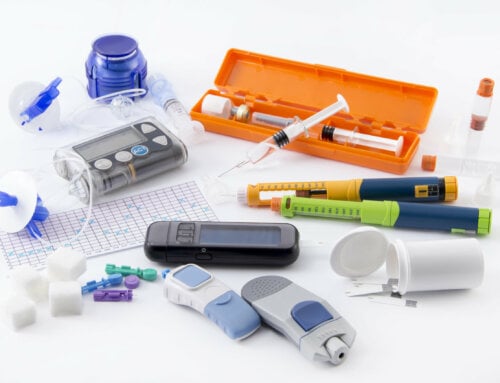There is so much misinformation floating around when discussing different aspects of diabetes and how best to take care of yourself, when you do have diabetes. Knowing the difference between diabetes fact or fiction, truth or myth, can be extremely helpful in your daily care when dealing with a chronic disease like diabetes. Below find out facts and myths you may not be aware of.
Eating Carbohydrates Causes Diabetes
Myth: Eating too much of anything including carbohydrates like fruit, rice, whole wheat, corn, milk, etc, causes weight gain. Weight gain promotes insulin resistance which is, “the inability to utilize the insulin your body produces”, and blood sugars start to increase. Insulin resistance eventually makes type 2 diabetes more likely as a diagnosis. When diabetes is diagnosed, then reducing carbohydrates is important for proper blood sugar control. Learn to count carbohydrates by taking a diabetes management program or seeing a registered dietitian who specializes in diabetes. Choose higher quality carbohydrates and skip the refined and processed ones. Carbohydrates are not the enemy to anyone with diabetes, however choices, meal timing and portions of carbohydrates are.
Nutrition Has an Impact on Your Overall Health Including Diabetes

Artificial Sweeteners Can Be Safely Used by People with Diabetes for a Sweet Taste in Any Amount
Myth: Controversy still swirls around the use of artificial sweeteners and varying reports emerge daily. The latest report states, “artificial sweeteners on their own do not cause weight gain and are safe to consume.” Other studies indicate that artificial sweeteners, “cause cravings and cause you to eat more.” Still, other studies say it may increase blood sugars while other studies say, “no, it does not.” Artificial sweeteners offered in the United States include saccharin- Sweet’ N Low, aspartame- Equal, steviol glycosides- Stevia, and sucralose- Splenda. Sugar alcohols will be discussed later. The bottom line is you can not consume them in any amount you want even though they are artificial sweeteners. Foods that contain artificial sweeteners still contain calories, fats, carbohydrates and protein and should be used only in moderation. Eating large amounts of anything may affect weight and blood sugars.
Diabetes and Heart Disease Are Related and Having Diabetes Increases the Risk of Cardiovascular Disease.
Fact: People with diabetes have a 2-3 times higher risk of heart attacks and strokes compared to people without diabetes. Diabetes accumulates too much glucose in the blood stream, when it is uncontrolled, which can damage the interior lining of your blood vessels. The body tries to repair this damage by adding and coating the inner layer of the vessel with cholesterol. Eventually the cholesterol will clog the vessels, increase blood pressure and the risk of blood clots. High blood pressure makes the work load on the heart more intense and elevated LDL levels raise the risk of heart attack and stroke. PAD, peripheral artery disease, is also very common with diabetes. Fatty deposits or plaques can build up in the legs causing reduced blood flow and leg pain. Add nerve complications from diabetes, neuropathy, and you may have a new set of problems such as slow healing foot wounds and foot ulcers. The good news is there are many ways to lower the risk of heart disease when you have diabetes.
Lifestyle Changes Can Impact My Future Risk of Heart Disease When I Have Diabetes
Fact: Simple but consistent lifestyle changes can lower the occurrence of heart disease when you have diabetes. Eating a healthy diet, starting and maintaining an active life with different types of exercise such as aerobics, stretching or weights, no smoking and quitting if you are a smoker, limiting alcohol if you are a drinker, losing weight and reducing stress by practicing yoga or deep breathing, are all important lifestyle changes. Discuss taking a baby aspirin daily with your health care provider, use statins for cholesterol if recommended, and take diabetes medications and blood pressure medications as suggested. Remember to attend all check-ups and follow-up appointments with every team member. These simple guidelines can help keep you free from heart disease.
I Should Add Cinnamon to My Foods and Drinks to Help Lower My Blood Sugars?
Fact and Myth: Again, an assortment of studies confirms, “that a teaspoon of cinnamon a day can lower blood sugars”. Other studies don’t seem to agree. You should never replace your diabetes medications with cinnamon or any other supplement. On another note, not all cinnamon is created equal. Most grocery store brands of cinnamon are, “cassia cinnamon” which contains high levels of Coumarin. Eating high amounts of cassia cinnamon, more than a teaspoon a day, can result in liver damage and liver disease. A better choice is Ceylon cinnamon which can be purchased in a health food store. Ceylon cinnamon is lighter in color, milder in taste with “60 times less coumarin” which is a safer option. Please tell your health care provider about any vitamins, minerals, supplements or spices you are taking since they may interact with your prescription medications.
Sugar Alcohols Which Are Used as Sweeteners in Sugar-Free Foods Can Be Eaten in Any Amount
Myth: As with artificial sweeteners, too many sugar alcohol products can cause gas, bloating, diarrhea and other stomach ailments. Sugar alcohols include xylitol, sorbitol, maltitol and starch hydrolysates. These foods and drinks contain calories and carbohydrates and must be eaten in moderation and proper portion size. A new sugar alcohol called erythritol is naturally found in fruits and vegetables and is different than the other sugar alcohols. It stimulates the sweet receptors on your tongue and has less calories than sugar or xylitol. It seems to be better tolerated, which has been proven in multiple studies, and is absorbed into the blood stream. It does produce some gas since it is not digested, but less than other sugar alcohols. Look for erythritol soon, since it will start to appear in sugar-free food products.
Changes Are Now Being Made to Help Keep the Cost of Insulin Down

Monitoring Daily Blood Sugars with a Glucose Meter Has No Impact on Overall Blood Sugar Control and Risks of Diabetes Complications. Only the 3 Month A1C Matters
Myth: Daily blood glucose testing gives you so much more information about what happens to your blood sugar, day to day and even hour to hour. It can help you learn about how your food choices, food portions, timing of meals, diabetes medications, illness and exercise affect your blood sugar levels. People with diabetes are entitled to a glucose meter and strips to test blood sugars through their health insurance. You can also purchase one out of pocket.
Salt and Sodium Are the Exact Same Thing
Myth: Salt contains sodium and chloride, but the sodium is the important part that is relevant to your health. Low sodium foods are foods with 140mg per serving or less than 5% of your daily allowance. We all require some salt and all foods are now listing sodium amounts on the labels. Craving salt is a reality. The more you eat, the more you crave. As you reduce the amount of salt you eat, your taste for it decreases. There are salt substitutes which contain potassium chloride which may cause other problems. Consult with a dietitian or health care provider before you make any changes. With diabetes, you should eat 1500mg of sodium a day. The average American eats about 3500mg a day. Hidden sodium appears in salad dressings, canned soups, canned vegetables, tomato sauce, spaghetti sauce, BBQ sauce and other condiments. The USDA guidelines for a healthy adult is 2300mg a day. Not everyone is salt sensitive, but it does influence blood pressure in many people.
There is good information out there and inaccurate information too. Make sure you are finding the information which can help you make better informed decisions to take care of your health.
Have a question or comment? Then post below, no registration required. I would love to hear from you!
NOTE: Consult your Doctor first to make sure my recommendations fit your special health needs.







Hi Suzanne, It sounds as though you are trying really hard and making many good changes. Yes, insulin resistance is very common in pre-diabetes and type 2 diabetes. Being over weight -5’4″ at 248 is almost 100 pounds over your desired weight depending on your body and bone size. This sets you up for insulin resistance which just means you are not using your own insulin properly. It takes more and more insulin to do the same job and eventually your pancreas just gives out.
I do not know your body composition or bone size but have you been to a diabetes education management class? Are you on any medications or just diet controlled? Have you had your thyroid tested?
Your A1C is still considered acceptable by the American Diabetes Association which allows up to 7%. For weight loss, you may need to drop your calories in the range of 1400 calories daily. Make sure to spread out your meals, never skip meals and add a small bedtime snack. Drink plenty of non-caloric beverages – preferably plain water. Do not allow yourself to get overly hungry.
You are definitely on the right track but may need more specialized help. I know it seems difficult but you may need to meet with a dietitian for specific advise based on other blood work, etc. You also need to raise your exercise level. On the days you do not do swim, do aerobics, kick boxing, or simply start a walking program. Work your way up to 30 minutes or more. It is not easy to lose weight when you have diabetes but it is possible.
Do not focus so much on the weight number on the scale as much as your daily blood sugars, your A1C, cholesterol/triglycerides and how you feel. You can talk to your physician about bariatric surgery if they decide you are 100 pounds over your ideal weight. You may also consider Weight Watcher’s but you should not eat all the fruit that they allow. 2-3 servings a day is much better for you since fruit is sugar. Please be patient and continue to see if you are losing- even a small amount weekly. Stay positive and best of luck! Let me know how you progress.
Nurse Robbie
I’ve recently been diagnosed and am still trying to figure things out. My A1C was 6.8 on the last test; 6.2 before that. I have been weight loss resistant for about 8 years. Is this a common factor with pre-diabletes, and diabetes? My pre food testing has been between 108-124 usually and post eating has been below 150. I want to make sure I turn this around and know that weight loss will help, but my body is not giving it up…I weigh 248, and am about 5’4″. I eat a very healthy diet…under 1700 calories mostly from lean meats, lots of veggies and 3-5 servings of whole grains or starchy veggies; I usually have 2 or 3 servings of fruits and am exercising ( water aerobics and kick boxing) at least 3 or 4 days a week. Help?